- Private & confidential service
- Genuine medication
- All-inclusive service - No hidden fees
- Next day delivery
- Asthma
- Inhalers for cough and hay fever
Using an inhaler for a cough and hay fever
Asthma symptoms include more than just breathlessness. Coughing is one common symptom of asthma, which can exacerbate other conditions such as hay fever and the common cold/flu. On this page, we look at the connection between coughing and asthma. Alternatively, you can order now to receive your preferred inhaler. This includes free UK delivery and you can have your inhaler delivered as early as tomorrow when ordered before 4.30pm Monday-Friday.
Is it safe for me to use an inhaler if I don't have asthma?
Yes. The aim of asthma medications is to relax the airways and reduce inflammation to allow more air intake. Bearing this in mind, it is possible to use an inhaler without being diagnosed with asthma. This includes if you have a tight chesty cough, hay fever or another relatable respiratory condition.
Inhalers and all asthma medicines are prescription medication. It is therefore always advised to visit a doctor, and this is a legal requirement in the UK. This is to ensure the treatment is right for you and you are not prone to any potential risks.
That being said, inhalers are usually well-tolerable amongst the majority of users, including those offered an inhaler for conditions such as COPD and allergies. This is especially true of the blue inhaler, otherwise known as a reliever inhaler, which is used on a needs-be basis such as Ventolin.
Get asthma treatments online
at HealthExpress
View Treatments
Reasons for your cough
Coughing is the body's way of trying to remove an irritant. When you have a cough, your body is trying to shift the mucus from your nose and throat. Coughing is also a sign of asthma and can bring on asthma symptoms. Other reasons for a cough include:
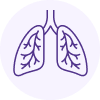
|
Bronchitis |
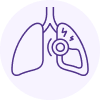
|
Pneumonia |

|
ACE inhibitors |

|
Allergies |

|
Postnasal drip |
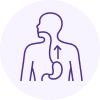
|
Gastroesophageal reflux disease (GERD) |
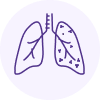
|
Chronic obstructive pulmonary disease (COPD) |
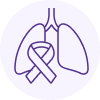
|
Lung cancer |
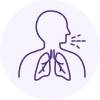
|
Side effects |
Can I use an inhaler for a cough?

Yes, if a doctor has permitted you to do so. Colds can cause a persistent cough that leaves you exhausted and unable to sleep. Sometimes a doctor will prescribe a temporary inhaler for a cough or other symptoms of a cold that affects your breathing. In particular, if the patient's chest feels tight, if there is mucus or persistent coughing. This doesn't necessarily mean they have asthma.
Asthma inhalers soothe the airways and suppress the need to cough. They can allow you the peace to recover. If an inhaler such as Ventolin doesn't help, and the cough worsens, it's important to see a doctor again in case there's an underlying infection or other problem.
For a cough, reliever inhalers are nearly always the answer compared to being prescribed preventer inhalers. This is due to the fact that you should only be using an inhaler over a short period and when it's needed to subdue a cold and dry cough, and not for a long-term solution.
To take your blue inhaler for a tight chesty cough, dry cough or for wheezing, the doctor will give you further instructions. Don't be afraid to ask the doctor to demonstrate the technique, particularly if you aren't used to the medication or device.
It is important to note that you should always follow your doctor's instruction and the instructions on the patient leaflet
Whilst this is the usual dosage requirements, it may differ from person-to-person depending the severity of your cough and cold.
Buy your inhaler online
at HealthExpress
View Treatments
The flu vaccine for asthmatics
Risk groups are eligible for a free flu vaccine on the NHS. All children in the UK are offered a flu vaccine, as are the over 65s and people with weakened immune systems, those with an underlying health issue and those who are the main carer for an elderly or disabled person whose welfare is at risk. Asthmatics are often eligible for a free flu vaccine due to underlying health reasons such as mucus and the coughing that accompanies colds and flu.
| Asthma Risk Groups | |
|---|---|
 All asthmatics |
 Over 65s |
 Pregnant women |
 Serious heart complaints |
 Children between 2-3 years old |
 Those with long-term health conditions |
 Chest complaints (bronchitis and emphysema) |
 Serious heart complaints |
 Serious kidney disease |
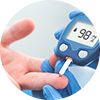 Diabetics |
 Weakened immune system |
 If you've had a stroke or TIA |
 If your BMI is over 40 |
 Spleen complaints |
The flu vaccine is designed each year to protect patients from the coming year's flu, so they need to be booked yearly. It is not a guarantee because medical professionals can only predict what viruses are likely to occur. Adult flu jabs are given via a needle; children are given a nasal spray. Flu vaccinations are best taken in early autumn (September to November) as protection from the winter flu bugs.
Not everyone with asthma needs to have the flu jab. Your doctor or asthma nurse may suggest it if you've been hospitalised because of asthma, take steroids tablets or use a preventer inhaler. If you only use a reliever inhaler you can request a flu vaccine if you feel it will help. Flu vaccines are given on clinical merit so your doctor will make the decision.
If you have asthma keep a close eye on your asthma symptoms during cold and flu season. Fill out an asthma diary each day and ensure you take your medication properly. See your doctor immediately if you feel your asthma is worsening.
Unfortunately cold and flu viruses are a common trigger for people living with asthma. The best course of action is to eat well, drink plenty of fluids and keep washing your hands. Ensure your asthma plan is up to date and that you have plenty of asthma medication.
If at any point you feel your asthma is worsening due to a cough or other cold and flu symptoms make an emergency appointment to see your doctor.
Other ways to combat a cough
If you have a cough that won't dissipate it is worth seeing your doctor; there are treatments that can help you. Some people find that persistently coughing, even if it is simply due to postnasal drip, is tiring and disruptive. You may keep yourself and others awake at night.
- Try drinking more fluids - Hot water with lemon and honey is a traditional remedy that soothes sore throats produced by coughing.
- Cough sweets can help and your pharmacist may advise you to take a cough suppressant.
- A hot shower before bed can loosen mucus, but if you are asthmatic be careful that the humidity does not trigger your symptoms.
Can I use an inhaler for hay fever?

Some people suffer from allergic rhinitis - a reaction to an allergen such as pollen, animal hair or dust – more commonly referred to as hay fever.
Dr Jean Emberlin, scientific director of Allergy UK, believes over the past 30 years numbers of hay fever sufferers have doubled. In winter months, those with hay fever may not be bothered by symptoms. When the weather warms up they may start to notice symptoms such as a coughing, itchy throat or tight chest. This is going to worsen symptoms of asthma if you happen to have both a respiratory condition and hay fever. In addition, if you only have hay fever and it tends to affect your throat and airways in particular, you can be prescribed a reliever inhaler to combat these symptoms.
Again, if your cough is persistent, you can visit your doctor and suggest an inhaler. The doctor will review your particular severity of the condition and may prescribed a reliever inhaler as temporary treatment.
It is also possible to use many hay fever treatments along with an inhaler without any harm. It is important to read the patient leaflets carefully beforehand just in case.
If you have ordered an inhaler before for hay fever, or other allergies that affect the airways, you can complete an online consultation and potentially get it online.
Buy your inhaler online
at HealthExpress
View Treatments
Can I use an inhaler for cystic fibrosis?
Those with cystic fibrosis sometimes suffer from a build of mucus in their lungs. When used with other treatments to remove mucus or infections, an asthma inhaler can reduce inflammation and open up airways. This is important because repeat infections can damage lungs.
For cystic fibrosis, you should always visit your doctor before requesting an inhaler to ensure they are appropriate for you. This will give you an opportunity to note down the dosage requirements.
Nebulisers are also used to treat cystic fibrosis. These are devices that transform liquid mediation into mist.
Can I use an inhaler for COPD?
COPD stands for Chronic Obstructive Pulmonary Disease. This includes illnesses such as emphysema and chronic bronchitis that cause serious breathing difficulties.
Over time, symptoms can worsen. Asthma inhalers help COPD sufferers to breathe by opening airways and allowing more oxygen into the lungs. Inhalers don't cure COPD, but they can hugely improve quality of life.
How do I get an inhaler from the doctor?
Book an appointment with your doctor depending on the severity of your symptoms. For example, be prepared for the hay fever season and book an appointment a couple of weeks in advance or use an emergency appointment system if your symptoms have arisen quickly.
Explain your symptoms to a doctor and you can always mention that you have read that inhalers can help. See what your doctor can suggest.
The doctor will need ask a few questions and maybe a physical test involving blowing into a spirometer to check your lung function. Depending on the doctor's analysis, you will be offered a prescription for an inhaler.
Get asthma treatments online
at HealthExpress
View Treatments
How do inhalers affect the environment?
The type of inhaler you choose can have a big impact on your carbon footprint. The propellant used in pressurised metered dose inhalers (pMDIs) alone is responsible for around 3% of total NHS carbon emissions.
Fortunately, other inhalers such as dry powder or soft mist types emit far fewer greenhouse gases and are a greener alternative to pMDIs
Reduce your carbon footprint
- MDIs release harmful greenhouse gases with each puff
- These gases cause global warming
- Low-carbon inhalers, such as DPIs and SMIs, can cut your carbon footprint
When choosing an inhaler, remember to be mindful of the impact your choice will have on the environment.
What if I'm struggling to use an inhaler?
It is not surprising if you are unused to the medication if you're not an asthmatic or COPD sufferer. Asthmatics themselves can struggle to ingest the medicine of both blue and brown inhalers effectively.
If you have a tight chesty cough that is causing wheezing, finding the breaths to successfully absorb the medication is difficult. The same goes for any symptoms of allergies.
If this is the case, a doctor can give you what is known as a spacer.
- It is a plastic "bubble", or tube, that attaches to the end of the inhaler.
- The other end has an opening for your mouth.
- This allows you to keep the medication in one space to absorb in much more of a controlled manner.
Will an inhaler cure my condition?
Using an inhaler – whether you have asthma or one of the above ailments – cannot completely cure a respiratory condition or allergy, but to aid in the recovery. Asthma is a chronic condition that can develop over time; it can also improve or disappear over time. The same goes with allergies, but an inhaler's job is to ease symptoms, not cure the condition.
It will relieve a cough, reduce mucus and widen airways making breathing far easier, and allows your lungs to recover.
Always see your doctor for breathing issues

Asthma inhalers such as Ventolin and Clenil Modulite work by opening airways. Inflamed, irritated and sore airways can be symptoms of many illnesses, not just asthma, so bear in mind if you're experiencing a cough or breathing issue you must visit your doctor.
Asthma kills three people a day in the UK so it's important to find out if you've developed asthma or another serious condition. Don't just take an inhaler for a long-term cough because asthma can occur at any age. Moving to a different area, a change in weather, flu or smoking can trigger it.
medical form
medication
prescription
from pharmacy

